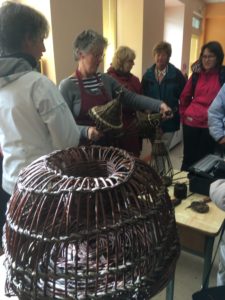26 October 2017
Could Brexit Save Twinning?
A new raison d’etre.
By Lynda Goetz
 Portsall is a picturesque Brittany village. If the name means anything to you at all it may be because it was just off the coast here that the Amoco Cadiz went down in March 1978 spilling 220,000 tonnes of oil which spread along 350 miles of coastline. A year earlier, the commune of Ploudalmézeau of which Portsall is a part, had become ‘twinned’ with Cullompton in Devon. Forty years on, this event was being celebrated – twice. Once in the spring by a visit from the French , 39 of whom came here, and again last weekend when 23 ‘Brits’ went over there. Everyone enjoyed a convivial if somewhat over-timetabled long weekend which included a tree-planting, a plaque-unveiling, sightseeing and, of course, a great deal of eating and drinking. Sadly, my feelings about this institution remain unchanged (see Shaw Sheet 2015 Welcome to Ourtown), namely that it has probably outlived its purpose, is really rather tired and pointless and has failed to renew itself sufficiently to appeal to the younger generations.
Portsall is a picturesque Brittany village. If the name means anything to you at all it may be because it was just off the coast here that the Amoco Cadiz went down in March 1978 spilling 220,000 tonnes of oil which spread along 350 miles of coastline. A year earlier, the commune of Ploudalmézeau of which Portsall is a part, had become ‘twinned’ with Cullompton in Devon. Forty years on, this event was being celebrated – twice. Once in the spring by a visit from the French , 39 of whom came here, and again last weekend when 23 ‘Brits’ went over there. Everyone enjoyed a convivial if somewhat over-timetabled long weekend which included a tree-planting, a plaque-unveiling, sightseeing and, of course, a great deal of eating and drinking. Sadly, my feelings about this institution remain unchanged (see Shaw Sheet 2015 Welcome to Ourtown), namely that it has probably outlived its purpose, is really rather tired and pointless and has failed to renew itself sufficiently to appeal to the younger generations.
 These observations are borne out by the fact that the average age of those on last weekend’s jaunt was probably nearer 70 than 60; that younger, slimmer, less grey versions of most of those participating featured in those early photos on display in the ‘40 Years of Twinning’ Exhibition and that, even after four decades, the majority of the English speak very little French. So, apart from being a nice little ‘jolly’ for a coachload of OAPs, what is the point of Twinning? In brief, as I said in my earlier article on this subject, it was set up after the war to encourage Europeans to broaden their horizons and to engage on a personal level with other nationalities. At that time of course there was no EU, not even a Common Market, and the initiative was an important step in post-war politics. The twinning movement was supported by the Council of European Municipalities and Regions (CEMR) and given funding at local level. There is no longer funding and these days the organisations are generally self-funded by the members themselves.
These observations are borne out by the fact that the average age of those on last weekend’s jaunt was probably nearer 70 than 60; that younger, slimmer, less grey versions of most of those participating featured in those early photos on display in the ‘40 Years of Twinning’ Exhibition and that, even after four decades, the majority of the English speak very little French. So, apart from being a nice little ‘jolly’ for a coachload of OAPs, what is the point of Twinning? In brief, as I said in my earlier article on this subject, it was set up after the war to encourage Europeans to broaden their horizons and to engage on a personal level with other nationalities. At that time of course there was no EU, not even a Common Market, and the initiative was an important step in post-war politics. The twinning movement was supported by the Council of European Municipalities and Regions (CEMR) and given funding at local level. There is no longer funding and these days the organisations are generally self-funded by the members themselves.
 Obviously attempts have been made over the years to engage the young – to include schools and youth football teams, to encourage exchange visits and to attempt to bring together those with similar interests. Somehow it has been a law of diminishing returns. At the outset there were school exchanges and youth football teams. Increasingly this has been an aspect which has faded out as fewer and fewer schools have been persuaded to get involved. Much of this reluctance, it has to be said, has been on the English side, where enthusiasm for such cultural and linguistic exchanges seems to have diminished considerably. Whether this has to do with increased Health and Safety demands for any sort of school outing, the reduction in numbers of pupils learning languages in schools, the reluctance of parents to subject their children to the undoubted difficulties of spending time in families where the language and culture are alien, or simply the availability of so many more exotic holidays or school trips, is hard to know. It is undoubtedly the case that youth involvement on both sides is minimal and that enthusiasm on this side of the Channel is rather limited to a few die-hards, many of whom are prepared to love the culture but make minimal effort with the language.
Obviously attempts have been made over the years to engage the young – to include schools and youth football teams, to encourage exchange visits and to attempt to bring together those with similar interests. Somehow it has been a law of diminishing returns. At the outset there were school exchanges and youth football teams. Increasingly this has been an aspect which has faded out as fewer and fewer schools have been persuaded to get involved. Much of this reluctance, it has to be said, has been on the English side, where enthusiasm for such cultural and linguistic exchanges seems to have diminished considerably. Whether this has to do with increased Health and Safety demands for any sort of school outing, the reduction in numbers of pupils learning languages in schools, the reluctance of parents to subject their children to the undoubted difficulties of spending time in families where the language and culture are alien, or simply the availability of so many more exotic holidays or school trips, is hard to know. It is undoubtedly the case that youth involvement on both sides is minimal and that enthusiasm on this side of the Channel is rather limited to a few die-hards, many of whom are prepared to love the culture but make minimal effort with the language.
This lack of enthusiasm may of course be attributable to the simple fact that the English are able to travel throughout most of the world using only their own language. Why bother to learn another when the most useful language is the one you were born into? French has long ceased to be the language of diplomacy. German may be useful as a technical language, but most Germans speak English. Spanish, the only language growing in popularity in English schools, is perceived to be of more global significance, but realistically probably only if you wish to visit Spain or South America (apart from Brazil, of course). So is language at the root of the problem?
There is no doubt that language learning and language teaching in this country are poor compared with many other countries. The situation has been the despair of many linguists, language teachers and experts for years. There is no compulsion to learn a language at primary school level and since 2004 none to continue at secondary school level after 14. The introduction of the EBacc (English Baccalaureate, a school performance measure which does include a language at GCSE) does little to change things. The number of children continuing to take a language after GCSE continues to go down, as do the numbers taking languages at university. The GCSE exams are seen as being formulaic and uninspiring and generally do not prepare students for further language study. In a piece for The Guardian in 2013, Louise Tickle quoted Dr Robert Crawshaw of Lancaster University as saying that “To be more aware of otherness is certainly one of the side effects of learning a foreign language, which is not regarded at the moment as one of the core aspects of primary and secondary language learning.”
In Brittany not only are both adults and children keen to learn English (which they see as a key to both worldwide travel and employability), but for the last 40 years they have also been trying to keep alive their own Breton language and to this end have set up schools where Breton, not French, is the main language used. In an article on early language learning in The Telegraph in 2014, Catherine Ford, Head of Moreton First Prep in Shropshire, discussed not only the many benefits of learning a foreign language, but also the benefits of starting young. Unfortunately, the UK is a very long way from this being considered an essential part of early learning.
At the moment many young people are desperately upset at what they see as the ‘betrayal’ of older generations in voting Leave. This viewpoint fails to understand that the vote was not to leave Europe, but to leave the massively bureaucratic institution which is the EU. That was not what we joined and we have failed to halt the transmutation of the Common Market into a huge money-eating federal bureaucracy. Certain areas, geographic, institutional and academic will miss the injection of funds ‘provided’ by the EU. Those funds, however, have all to be generated by the economic activity of its members and the UK, with its higher Gross National Income (GNI) than the majority of the other 27 nations is, as we should all know by now, the second largest net contributor to EU funds.
 EU funds are important to Brittany which, like Cornwall (and Scotland), has benefited massively from grants designed to help some of the less wealthy areas of Europe. Ploudalmézeau is the proud owner of a number of very impressive publicly-owned spaces such as L’Arcadie, the Cultural centre and the Médiathèque (the modern equivalent of the bibliothèque or library). It is good to know that these areas, which not so very long ago were places where the parents and grandparents of our weekend hosts were earning a livelihood by hauling wrack (seaweed) out of the sea and dragging it onto dry land in horse-drawn carts to be ‘cooked’ in special pits to make iodine and soda, are now very much part of the 21st century. The opportunity to find out about these aspects of life at first-hand is fascinating and definitely easier if one has made the effort to master the language of one’s hosts.
EU funds are important to Brittany which, like Cornwall (and Scotland), has benefited massively from grants designed to help some of the less wealthy areas of Europe. Ploudalmézeau is the proud owner of a number of very impressive publicly-owned spaces such as L’Arcadie, the Cultural centre and the Médiathèque (the modern equivalent of the bibliothèque or library). It is good to know that these areas, which not so very long ago were places where the parents and grandparents of our weekend hosts were earning a livelihood by hauling wrack (seaweed) out of the sea and dragging it onto dry land in horse-drawn carts to be ‘cooked’ in special pits to make iodine and soda, are now very much part of the 21st century. The opportunity to find out about these aspects of life at first-hand is fascinating and definitely easier if one has made the effort to master the language of one’s hosts.
Perhaps, if we do ever manage to untangle ourselves from an EU reluctant to lose our contribution to its largesse, the young might wake up to the need to make more urgent efforts to communicate with their counterparts in Europe – without relying on everyone else’s language skills. They might even see the point in putting themselves out to understand the many different cultures of those in Europe and to engage in cultural and linguistic exchanges as a way of doing so. In the meantime, perhaps those who already participate and express themselves keen to undertake exchange visits should appreciate how much more can be got out of such experiences if the language of the other nation is not a closed book. Contrary to fearful expectations, such visits are unlikely to prove more difficult to undertake after Brexit (many were made before we joined the Common Market, after all) and perhaps they might even become more valued.
If you enjoyed this article please share it using the buttons above.
Please click here if you would like a weekly email on publication of the ShawSheet

